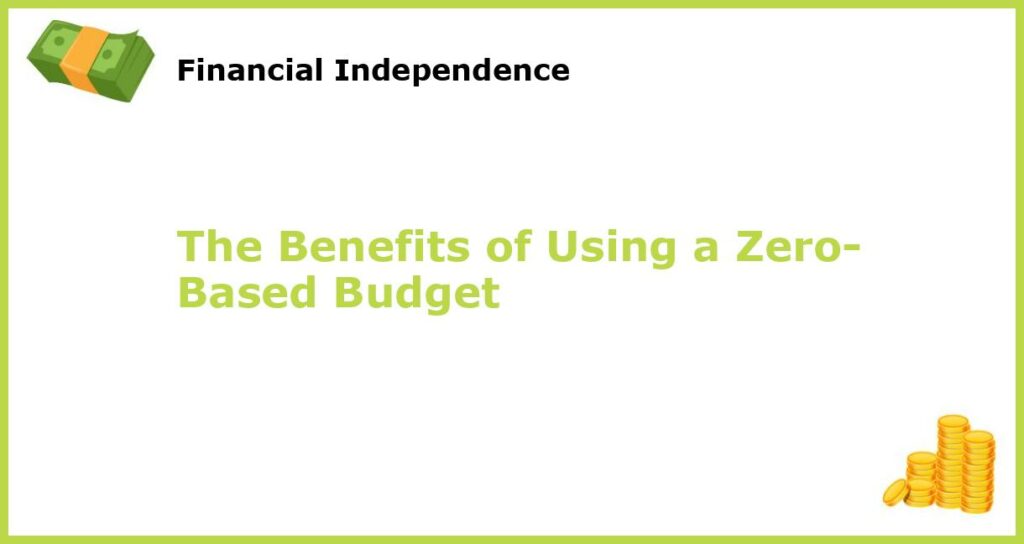Budgeting is an essential part of running a successful business. It’s fundamental to understand the revenue and expenses of the organization to make informed decisions. There are various types of budgeting, from incremental budgets to more advanced methods such as activity-based budgeting, but zero-based budgeting is an increasingly popular technique. If you haven’t considered switching to zero-based budgeting, let’s check out the benefits of using it.
Understanding Zero-Based Budgeting

Zero-based budgeting is a budgeting method that requires businesses to start every budgeting period from scratch. It means that companies review and justify each expense before creating a new budget for the upcoming year. Unlike traditional budgeting methods, zero-based budgeting does not rely on previous budgets or the incremental approach. Instead, zero-based budgeting involves creating a budget from scratch based on the actual needs and expenses of a business. It is a somewhat time-consuming exercise, but it can help the organization to achieve some significant advantages.
A More Accurate Budget

The main advantage of using a zero-based budget is that it provides a more accurate budget. Because zero-based budgeting requires businesses to scrutinize every expense and justify it, they are better able to identify unnecessary expenses and eliminate them. Zero-based budgeting involves examining every line item to ensure that it aligns with the company’s strategic goals. Therefore, departamental managers have to identify any wasteful spending and cut it off. As a result, the organization has a more accurate budget that reflects the actual requirements of the business.
Greater Control Over Spending

Zero-based budgeting also provides greater control over spending. By examining every expense and determining whether it is necessary, businesses can cut back on expenses that do not contribute to their bottom line. This can help businesses achieve their goals faster and stay within their budgetary constraints. With greater control over spending, businesses can direct resources towards more impactful initiatives that add value to the business. It can also help to build a culture of cost control within the organization.
Better Transparency

Zero-based budgeting also promotes greater transparency within a business. Because every expense is examined and justified, everyone in the organization can understand the budget and how it works. It ensures that everyone is aware of the company’s expenses and can make informed decisions about where to allocate their resources to achieve the company’s strategic goals. By providing transparency, it can also help to promote better communication within the organization.
Reduced Waste

Another benefit of using a zero-based budget is that it can help reduce waste. By examining every expense and determining its necessity, businesses can reduce or eliminate expenses that are not necessary or provide little value. This can help to improve the efficiency of the business and reduce waste. The zero-based budget promotes a more efficient and lean organization by forcing managers to consider every last expenditure, resulting in greater awareness of the costs of operations.
Better Cash Flow Management

Zero-based budgeting also promotes better cash flow management. By examining expenses and budgeting for them on a regular basis, businesses can project their cash flow more accurately and plan for unexpected expenses. This can help businesses avoid cash flow problems that can occur when unexpected expenses arise. Better cash flow management can help the business to be more financially stable, allowing it to better weather any economic storm.
Improved Decision-Making
Zero-based budgeting can also help businesses make better decisions. By examining every expense and determining its necessity, businesses can make more informed decisions about which expenses to keep and which ones to cut. This can help businesses make smarter investments and improve their bottom line in the long run. The analysis of expenses helps in identifying any inefficiencies, which frees up resources to drive growth.
Flexibility
Zero-based budgeting is also flexible. Unlike traditional budgeting methods, which rely on previous budgets, zero-based budgeting can be adapted to changing circumstances or priorities. This allows businesses to be more agile and respond more quickly to changes in the business or economic environment. Managers can divert resources to a new product or service line when external factors impact the financial health of the company.
Greater Awareness of Risks
Finally, using a zero-based budget can help businesses be more aware of risks. By examining every expense and determining its necessity, businesses can identify areas where they may be at risk and take steps to mitigate that risk. This can help businesses avoid potential problems before they become major issues. It helps the management of the company to recognize areas that a traditional budget may miss, such as changes in supply chain costs, new regulations, or other unforeseen circumstances.







